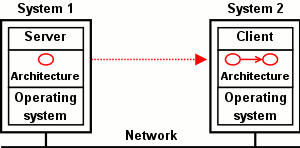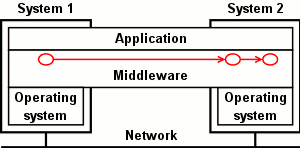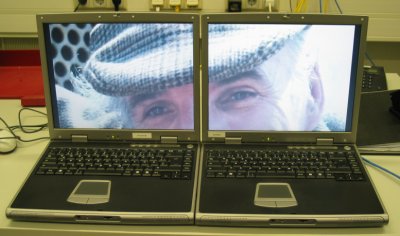Linux gains open source multimedia middleware
Aug 14, 2007 — by LinuxDevices Staff — from the LinuxDevices Archive — 33 views A seven-year-old, dual-licensed project for cross-platform multimedia middleware has achieved its first stable release. Motama's NMM (network-integrated multimedia middleware) 1.0 lets developers build distributed, heterogeneous multimedia applications with advanced features like synchronized whole-house digital media distribution… on commodity networks, and seamless “follow-me” hand-offs between output devices.
A seven-year-old, dual-licensed project for cross-platform multimedia middleware has achieved its first stable release. Motama's NMM (network-integrated multimedia middleware) 1.0 lets developers build distributed, heterogeneous multimedia applications with advanced features like synchronized whole-house digital media distribution… on commodity networks, and seamless “follow-me” hand-offs between output devices.
 NMM 1.0 appears to be an open source implementation of many of the features found in the Sonos Digital Music System (depicted at right), a widely distributed commercial product based on embedded Linux. Whereas Sonos uses a proprietary Sonos wireless mesh network, NMM uses standard wired or wireless networking, according to Motama.
NMM 1.0 appears to be an open source implementation of many of the features found in the Sonos Digital Music System (depicted at right), a widely distributed commercial product based on embedded Linux. Whereas Sonos uses a proprietary Sonos wireless mesh network, NMM uses standard wired or wireless networking, according to Motama.
NMM's features also resemble many of the capabilities integrated into the latest version of LinuxMCE, a KDE-based, media-oriented Linux distribution.
The NMM project pre-dates Sonos and LinuxMCE, however. It was founded in 2000 by Professor Philipp Slusallek, of Stanford University and later of the Computer Graphics Lab at Saarland University, Germany. A version of NMM for Linux was released under an open source license in 2002. Then, in 2005, Saarland University researchers Marco Lohse and Michael Repplinger founded Motama, together with Slusallek, in order to commercialize NMM. The new 1.0 release of NMM is the first to be officially maintained by Motama.
NMM, shown distributing an image across two laptops — one running Linux, and the other running Windows
The NMM project got a big boost in April of this year, when KDE's Phonon multimedia framework project announced it would adapt NMM for use in KDE 4.0, expected to launch this October. However, it now appears from a KDE mailing list post that NMM will not make it into the 4.0 release.
NMM 1.0
NMM comprises a core runtime library with an extensive C++ API (application programming interface) together with about 60 available plugins, including virtual I/O devices, codecs, data processing elements, and on-screen displays. The library is portable and available as source, or pre-built for major OSes. The API is consistent across platforms, making it easier to build applications for multiple target OSes, Motama says.
Motama says that NMM works better than traditional network-based multimedia frameworks such as gstreamer, helix, and mpd due to a lower-level approach. It appears that NMM's core runtime library handles inter-application and inter-system message passing directly, bypassing network protocols like RTP and HTTP.


Traditional client-server (top) vs. NMM multimedia architecture (bottom)
Other touted benefits of NMM include:
- Simplifies development of distributed and networked multimedia applications
- Supports “all major operating systems,” including Windows XP and Vista, Mac OS X, Linux, and Linux running on the Playstation 3
- Available SDK includes “comprehensive documentation”
- Supports applications and plug-ins
- Enables “seamless” networking and transparent connections between multimedia devices
- Music stored or received anywhere within the home network can be enjoyed on multiple systems
- Media presentations in multi-room environments show “no perceivable delay or echo,” according to the company
- “Follow-me” feature allows seamless hand over between output devices
Repplinger stated, “Applications developed for one operating system can be run on any other supported platform with only little or no change. This allows for a single multimedia application to span across a number of heterogeneous devices, ranging from embedded systems, to PCs, to powerful servers and large-scale computing clusters.”
Availability
NMM 1.0 is available now, along with an SDK and documentation. The Linux and Playstation 3 Linux versions are available under the GNU GPL or Motama's commercial license. The Windows version is available under Motama's non-commercial license, as well as a commercial license. Motama has also launched a forum for NMM users.
This article was originally published on LinuxDevices.com and has been donated to the open source community by QuinStreet Inc. Please visit LinuxToday.com for up-to-date news and articles about Linux and open source.
